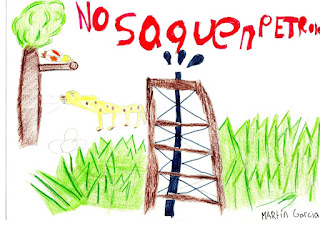![]()
 |
| Drawing made by a child from the Ecuadorian Amazon |
Towards the end of last year, the former Minister of Non-Renewable Resources, Wilson Pastor, announced in a press conference that among the companies interested in participating in the current round of bidding for the blocks in the southern Ecuadorian Amazon, there are Petrominerales, Pacific Rubiales and Conacol; Petrosud, Repsol, the Canadian company Talisman Energy, three companies from the United States (he did not specify their names), in addition to the state-owned Petrovietnam and Turkish National Oil and Gas.
The official line is that companies will come to our country with “cutting-edge technology” to operate in one of the most sensitive and biodiverse areas on the planet.
However, when we briefly review the information found on the Internet regarding the operations of these companies in Latin America and other parts of the world, it is easy to see that official discourse (state and business) is far from what really happens in the areas where they operate.
All references can be found at the bottom of this analysis:
Petrominerals (Canadian company, fourth largest crude oil producer in Colombia). In 2011, they had to suspend their production for more than a week due to strong complaints from communities in the Barranca de Upia municipality, who accused them of "violating workers' rights and polluting the environment." (1)
Pacific Rubiales, A Canadian company formed by Venezuelans, is associated in Colombia with the loss of indigenous peoples' territory, cultural permeabilization and fragmentation, loss of values, poverty, misery and generalized violence. In 2011, a strike broke out by workers who demanded job stability, a decent salary, freedom of association, industrial safety, among others. The Colombian government was forced to give the conflict "war treatment" (3) due to the dismissal of more than 1,500 workers by the company. next link (4) provides an extensive bibliography on the conflicts of Pacific Rubiales in Colombia, where it operates the fields with the highest production in that country.
Misleading advertising, rigged prior consultations, lack of social commitment, abuse of authority are some of the other accusations made against this company interested in participating in the oil exploitation of the southern blocks in Ecuador. (5)
Canacol, focuses its operations in Ecuador and Colombia.
Petrosud, has operated marginal fields in Ecuador.
Talisman Energy, Canadian company engaged in the exploration, development, production and marketing of crude oil and natural gas. Talisman has been charged with genocide for providing support to Sudan's government and funding paramilitary groups during the civil war that killed an estimated two million people.
Although the company stated that "they had learned the lesson from Sudan" in 2009 it entered the Peruvian jungle without any prior consultation or consensus. (6)
Also in 2011, the Achuar (in Peru) accused Talisman (in Canada) of polluting their environment with toxic waste and inciting violence and divisions among the indigenous people in order to maintain its oil activities in their traditional territory, while demanding that it leave their territory (7). Finally, in 2012, Talisman Energy announced its withdrawal from Peru. Today, it is one of the companies that aspire to exploit oil in Ecuador.
Repsol, Without a doubt, Repsol YPF, one of the giants of the business, is also one of those that maintains the most conflicts in the territories where it operates, mainly due to environmental and social issues.
The web Repsol Mata brings together a large number (always updated) of this company's incidents around the world.
The most recent case reports that Repsol would have hidden a leak of 6,000 tons of gasoline in Tarragona (Spain) (8), which together with the spill that occurred in February 2013 in Callao, Peru where a large quantity of crude oil was spilled that covered nearly two kilometers in length and more than 50 meters in width.
Both cases call into question the "cutting-edge technologies" with which its operations are promoted and with which it is also one of the companies that intend to operate in one of the most sensitive and biodiverse areas on the planet, in the Ecuadorian Amazon.
References:
1. http://www.avn.info.ve/contenido/obreros-paralizan-petrolera-canadiense-colombia-para-exigir-work-improvements.
3. http://www.pasc.ca/es/article/conflicto-laboral-con-la-canadiense-pacific-rubiales-recibe-trato-de-guerra
4. http://www.palabrasalmargen.com/index.php/articulos/item/cronologia-de-un-conflicto-el-caso-de-los-trabajadores-petroleros-de-puerto-gaitan-meta
5. http://www.elnuevodia.com.co/nuevodia/especiales/ecologica/159167-los-pecados-de-pacific-rubiales
6. http://grancomboclub.com/2009/04/la-segunda-gran-protesta-amazonica.html
7. http://www.ahoracanada.com/negocios/indigenas-achuar-exigen-a-talisman-que-salga-de-su-territorio.html
8. http://repsolmata.ourproject.org/spip.php?article249
